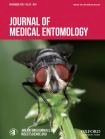 An entomology journal has issued its first retraction during the current editor’s nearly 30-year tenure — for a 2016 study with serious flaws in the analyses.
An entomology journal has issued its first retraction during the current editor’s nearly 30-year tenure — for a 2016 study with serious flaws in the analyses.
After the Journal of Medical Entomology (JME) published the study — about the identification of genes that enable an insect to detect odors — an outside researcher wrote a letter to the journal highlighting flaws in the paper. The journal then asked the authors to respond, and enlisted two additional peer reviewers to look into the study, the outside comment, and the authors’ response. They concluded the paper should be retracted.
William Reisen — the journal’s editor-in-chief from the University of California, Davis — said the journal believes the errors were unintentional and there was no fraud on the authors’ part. He added:
This was a case where the subject editor and the two peer reviewers did not catch mistakes the authors made in the interpretation of their data.
Reisen went on:
These errors were brought to my attention after publication and with concurrence of the JME Editorial board we retracted this paper and published comments from a reader and a rebuttal from the authors.
Reisen noted:
I am very embarrassed that this paper had to be retracted on my watch. However, our journal publishes a wide variety of papers and it is almost impossible to have a wide enough array of subject editors that are skilled in every topic/area of research. The paper in question was quite outside the realm of our normal submissions and this contributed to our failure to catch these mistakes in interpretation. This was the first retraction I have had to make since I started editing this journal in 1988.
Here’s the retraction notice, issued last month:
Shortly after the Journal of Medical Entomology published the above paper, the editor was notified of concerns regarding the authors’ identification of Odorant Receptor genes within the whole body transcriptome of the mite Tyrophagus putrescentiae Schrank. These concerns were detailed in a Letter to the Editor by Dr. H. Robertson, University of Illinois (Robertson 2016). The authors were asked to respond to these concerns and submitted a response (Qu 2016). The editor-in-chief engaged two new reviewers to consider the paper in light of these concerns and the authors’ response; these reviewers confirmed that the analysis was seriously flawed and recommended that the paper be retracted.
Based on issues with the interpretation and analyses of the sequences, the Journal of Medical Entomology is retracting this paper.
The original study, “Insights Into the Evolution of Chemoreceptor Genes Superfamily in Tyrophagus putrescentiae (Acari: Acaridae),” was published in April.
Hugh Robertson, based at the University of Illinois at Urbana-Champaign, who wrote the comment article about the paper, told us:
I’m sure there was no deliberate scientific fraud on their part, they were interested in olfaction in this mite and trying to find [odorant receptors] and simply tried too hard.
In his critique, Robertson argues that the authors have
conflated four G-protein- coupled receptors [GPCRs] involved in basic physiological processes with the recently evolved Odorant Receptor gene family of olfactory receptors in insects, therefore their claim to have identified members of this OR family in this mite, which would be a first for noninsect arthropods, is not correct.
In their response, the study’s first and last authors write:
We surmised that some GPCRs may be involved in olfaction and pheromone identification. We have compared the phylogenetic relationships of these GPCRs (which we named ORs) with the ORs in insects, which have been well studied. We here in suggest that the “ORs” in our paper should have been termed “the OR-like genes.” So far, many of the functions of the ORs have not been verified, only in the hypothetical state.
We’ve reached out to all the study’s authors — S. X. Qu, H. P. Li, L. Ma, and J. D. Song — who are based at the Jiangsu Academy of Agricultural Sciences in Nanjing, China. We’ll update the post if we hear back.
Like Retraction Watch? Consider making a tax-deductible contribution to support our growth. You can also follow us on Twitter, like us on Facebook, add us to your RSS reader, sign up on our homepage for an email every time there’s a new post, or subscribe to our daily digest. Click here to review our Comments Policy. For a sneak peek at what we’re working on, click here.
I guess there were some bugs….. 🙂